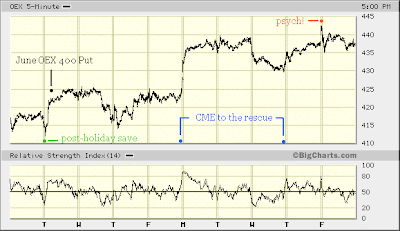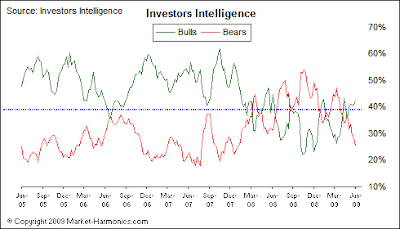Sometimes news you can use is found in what isn't said. Take a look at this...
Consumer Credit Plunges by $15.7 Billion
That's the preliminary April number. What makes this news rather interesting is:
March's decline originally was reported as $11.1 billion, which had been the most on records dating to 1943.
Turns out the March consumer credit contraction was revised upward to $16.6 billion.
Obviously none of this fits the "Economic Recovery" fairy tale CNBC shamelessly began spinning today with vigor following the release of non-farm payroll numbers ... so not one word about April consumer credit was spoken on air following its release at 3:00 p.m.
Not even Fast Money Trader Tim Seymour bothered mentioning this dismal report on tonight's show (in recently making his bullish case for the stock market Seymour has been expounding the importance of the consumer).
Now, this news, in and of itself, is not necessarily of vital interest. Rather, it's that the kibosh apparently has been put on making anything of it. Now, why would this be? Do you suppose it might be related to blatant attempts this past week at juicing the equity bid via the CME?
Enter the pre-market release of the non-farm payrolls report...
Only a year ago 345,000 jobs shed in a month would have been perceived a disaster. Now, however, it is being sold as a sign of "recovery."
The operative word here, of course, is "sold" because all week a concerted effort has gone into painting a bullish scenario should a "better than expected" jobs report be released today. Considering the fact employment numbers are notoriously under-reported, the Goebbels crowd at CNBC had little trouble making the recovery pitch once, lo and behold, the hoped-for sign from on high was received.
Like clockwork futures caught a fat bid. Yet within ten minutes of the market's open the purpose of the ruse was revealed...

Apparently, there are players out there who understand the name of the game is Inflate [credit] or Die. Not an easy task when the job market is shrinking (no matter the rate of contraction). The dismal consumer credit report coming despite the trillions of dollars being thrown at our bankrupt global financial system bears this out.
So, take the fact that, supposedly "better than expected" employment news was given the limelight and stone cold silence met the consumer credit report as the real story behind CNBC's "recovery" fantasy.
There's nothing new to add (on the technical front) substantiating my near-term bearish outlook. The break could come any minute now, or it might be delayed a few days. We certainly got confirmation today a melt-up is not likely in the cards, and more to the point, that the technical read is a more reliable source of actionable information than is the Wall Street propaganda machine.
Now, about the company I keep...

Why it looks like CNBC is not the only vested interest whose hopes are running high. All the more reason, then, to fear the worst...

* * * * *
© The Risk Averse Alert — Advocating a patient, disciplined approach to stock market investing. Overriding objective is limiting financial risk. Minimizing investment capital loss is a priority.
Analysis centers on the stock market's path of least resistance. Long-term, this drives a simple strategy for safely investing a 401(k) for maximum profit. Intermediate-term, investing with stock index tracking-ETFs (both their long and short varieties) is advanced. Short-term, stock index options occasionally offer extraordinary profit opportunities when the stock market is moving along its projected path.
Nothing is set in stone. Nor is the stock market's path of least resistance always known. More often than not, there are no stock index option positions recommended.
 There's an easy way to boost your investment discipline...
There's an easy way to boost your investment discipline...Get Real-Time Trade Notification!




















1 comments:
keep ranting
you might just be right , 700 billion to save intangible assets and pennies to save jobs at home.
Post a Comment